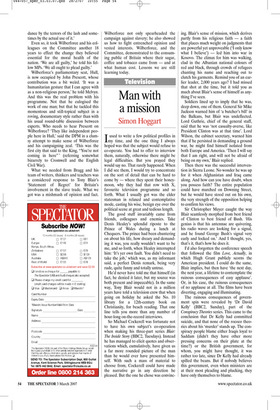Man with a mission
Simon Hoggart
Iused to write a few political profiles in my time, and the one thing I always hoped was that the subject would refuse to co-operate. You had to offer to interview them, naturally, otherwise there might be legal difficulties. But you prayed they would say no. That rarely happened. When I did see them, I would try to concentrate on the sort of detail that can be hard to come by — where they spent their honeymoon, why they had that row with X, favourite television programme and so forth. What I usually got was the elder statesman in relaxed and contemplative mode, casting his wise, benign eye over the political scene at great and tedious length.
The good stuff invariably came from friends, colleagues and enemies. Take Denis Healey’s splendid riposte to the Prince of Wales during a lunch at Chequers. The prince had been chuntering on about his life, how dreary and demanding it was, you really wouldn’t want to be me, and so forth, when Healey interrupted him: ‘It’s yer own fault. You didn’t need to take the job,’ which was, as my informant said, a perfect Denis remark, being very rude, quite funny and totally untrue.
He’d never have told me that himself (in fact, he denied it later, but my source was both present and impeccable). In the same way, Tony Blair would not in a million years have told a television crew that when going on holiday he asked the No. 10 library for a 12th-century book on Christianity, for beach reading. That one line tells you more than any number of hour-long on-the-record interviews.
So Michael Cockerell was fortunate not to have his own subject’s co-operation when making his three-part series Blair: The Inside Story (BBC2, Tuesdays). Instead he has managed to elicit quotes and observations which, cumulatively, have given us a far more rounded picture of the man than he would ever have presented himself. With such a mass of material to choose from, Cockerell could have made the narrative go in any direction he pleased. But the one he chose was convinc ing. Blair’s sense of mission, which derives partly from his religious faith — a faith that places much weight on judgments that are powerful yet unproveable (‘I only know what I believe’) — led him into war in Kosovo. The climax for him was walking, clad in the Albanian national colours of red and black, through crowds of refugees chanting his name and reaching out to clutch his garments. Remind you of an earlier leader, 2,000 years ago? I had missed that shot at the time, but it told you as much about Blair’s sense of himself as anything I’ve seen.
Soldiers lined up to imply that he was, deep down, one of them. General Sir Mike Jackson warned him of ‘a butcher’s bill’ in the Balkans, but Blair was undeflected. Lord Guthrie, chief of the general staff, said that he was ‘not casualty-averse, like President Clinton was at that time’. Lord Wilson, the cabinet secretary, warned him that if he persisted in demanding a ground war, he might find himself isolated from both Europe and America. ‘Then I will say that I am right, and will not be afraid of being on my own,’ Blair replied.
Then there was the successful intervention in Sierra Leone. No wonder he was up for it when Afghanistan and Iraq came along. And how can you have doubt, when you possess faith? The entire population could have marched on Downing Street, but he would have stood out on his own, the very strength of the opposition helping to confirm his views.
Sir Christopher Meyer caught the way Blair seamlessly morphed from best friend of Clinton to best friend of Bush. ‘His genius is that his antennae are quivering, his radio waves are looking for a signal, and he found George Bush’s signal very early and locked on.’ And I thought, yes, that’s it, that's how he does it.
I’d also forgotten the conference speech that followed the film Love, Actually, in which Hugh Grant publicly scorns the American president. I could do the same, Blair implies, but then have ‘the next day, the next year, a lifetime to contemplate the ruinous consequences of easy applause’. Or, in his case, the ruinous consequences of no applause at all. The films have been diverting, engaging and illuminating.
The ruinous consequences of government spin were revealed by ‘Dr David Kelly’ (BBC2, Sunday), part of the Conspiracy Theories series. This came to the conclusion that Dr Kelly had committed suicide, and that none of the rococo theories about his ‘murder’ stands up. The conspiracy people blame either Iraqis loyal to Saddam (didn’t they have other more pressing concerns on their plate at the time?) or the British government, for whom, you might have thought, it was rather too late, since Dr Kelly had already spilled the beans. But if nobody believes this government, even when ministers are at their most pleading and plucking, they have only themselves to blame.










































































 Previous page
Previous page